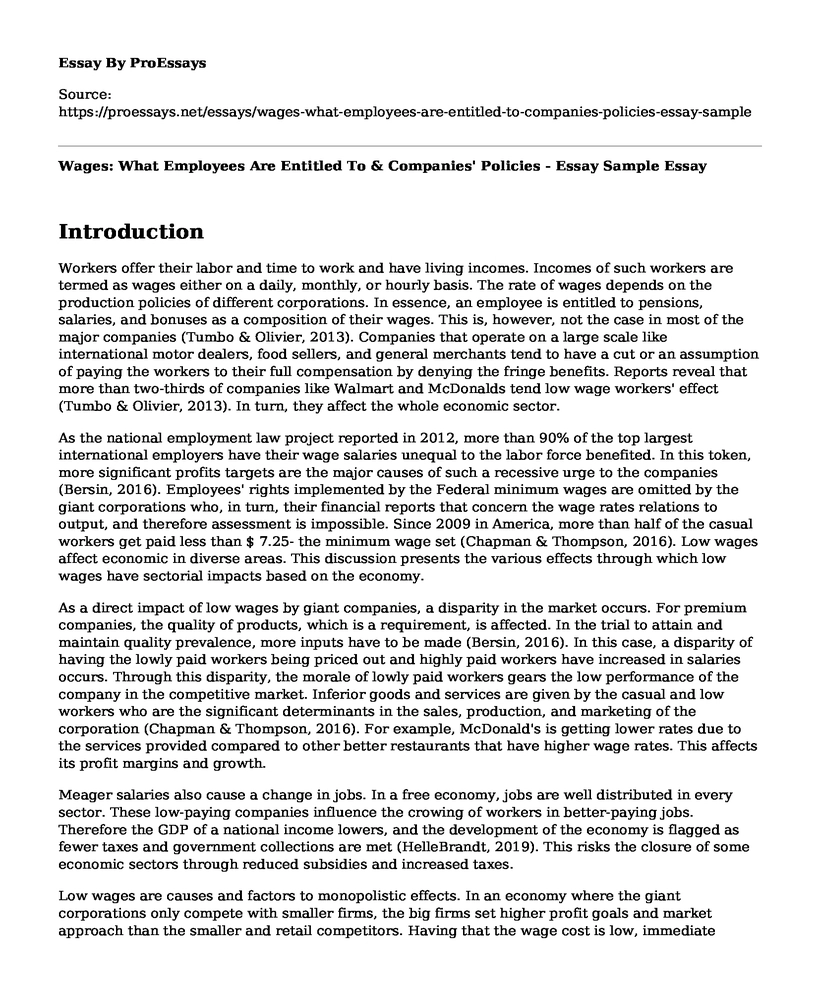Introduction
Workers offer their labor and time to work and have living incomes. Incomes of such workers are termed as wages either on a daily, monthly, or hourly basis. The rate of wages depends on the production policies of different corporations. In essence, an employee is entitled to pensions, salaries, and bonuses as a composition of their wages. This is, however, not the case in most of the major companies (Tumbo & Olivier, 2013). Companies that operate on a large scale like international motor dealers, food sellers, and general merchants tend to have a cut or an assumption of paying the workers to their full compensation by denying the fringe benefits. Reports reveal that more than two-thirds of companies like Walmart and McDonalds tend low wage workers' effect (Tumbo & Olivier, 2013). In turn, they affect the whole economic sector.
As the national employment law project reported in 2012, more than 90% of the top largest international employers have their wage salaries unequal to the labor force benefited. In this token, more significant profits targets are the major causes of such a recessive urge to the companies (Bersin, 2016). Employees' rights implemented by the Federal minimum wages are omitted by the giant corporations who, in turn, their financial reports that concern the wage rates relations to output, and therefore assessment is impossible. Since 2009 in America, more than half of the casual workers get paid less than $ 7.25- the minimum wage set (Chapman & Thompson, 2016). Low wages affect economic in diverse areas. This discussion presents the various effects through which low wages have sectorial impacts based on the economy.
As a direct impact of low wages by giant companies, a disparity in the market occurs. For premium companies, the quality of products, which is a requirement, is affected. In the trial to attain and maintain quality prevalence, more inputs have to be made (Bersin, 2016). In this case, a disparity of having the lowly paid workers being priced out and highly paid workers have increased in salaries occurs. Through this disparity, the morale of lowly paid workers gears the low performance of the company in the competitive market. Inferior goods and services are given by the casual and low workers who are the significant determinants in the sales, production, and marketing of the corporation (Chapman & Thompson, 2016). For example, McDonald's is getting lower rates due to the services provided compared to other better restaurants that have higher wage rates. This affects its profit margins and growth.
Meager salaries also cause a change in jobs. In a free economy, jobs are well distributed in every sector. These low-paying companies influence the crowing of workers in better-paying jobs. Therefore the GDP of a national income lowers, and the development of the economy is flagged as fewer taxes and government collections are met (HelleBrandt, 2019). This risks the closure of some economic sectors through reduced subsidies and increased taxes.
Low wages are causes and factors to monopolistic effects. In an economy where the giant corporations only compete with smaller firms, the big firms set higher profit goals and market approach than the smaller and retail competitors. Having that the wage cost is low, immediate compensation of the wage cuts ids transited to the sales and competitive factors (Naidu, Posner, & Weyl, 2018). These large companies make higher profits, and therefore lowering their prices do not affect them. This makes it easy for large corporations to use their flexible prices to chase away competitors from the market by setting lower prices of the same commodity which the competitor cannot set their producer cost to (Naidu, Posner, & Weyl, 2018). Upon monopolizing the market, the big companies have their corporate choice of enjoying the monopoly benefits by the exploitation of consumers.
Work Cited
Bersin. “The Effect of Major Corporations Paying Low Wages.” Myassignmenthelp.com, 2016, myassignmenthelp.com/free-samples/the-effect-of-major-corporations-paying-low-wages.
Chapman, Jeff, and Jeff Thompson. “The Economic Impact of Local Living Wages.” Economic Policy Institute Review, 2016, www.epi.org/publication/bp170/.
HelleBrandt. “Effect of Large Corporations Raising Wages of Low-Paid Workers.” PIIE, 21 May 2019, www.piie.com/blogs/realtime-economic-issues-watch/effect-large-corporations-raising-wages-low-paid-workers.
Naidu, Suresh, et al. “More and More Companies Have Monopoly Power over Workers' Wages. That's Killing the Economy. Vox, 6 Apr. 2018, www.vox.com/the-big-idea/2018/4/6/17204808/wages-employers-workers-monopsony-growth-stagnation-inequality.
Tumbo, Oliver. “GRIN - The Effects of Major Corporations Paying Low Wages.” Publish Your Master's Thesis, Bachelor's Thesis, Essay or Term Paper, 2013, www.grin.com/document/428479.
Cite this page
Wages: What Employees Are Entitled To & Companies' Policies - Essay Sample. (2023, Aug 02). Retrieved from https://proessays.net/essays/wages-what-employees-are-entitled-to-companies-policies-essay-sample
If you are the original author of this essay and no longer wish to have it published on the ProEssays website, please click below to request its removal:
- Management Essay Example: Solutions to Engstrom Problems
- Ethical Dilemma Report on Nike Corporation Paper Example
- Essay Example on At-Will Employment: Ethical Dilemma?
- Essay Example on Student Learning: Motivating for Success
- A Journey of Pursuing Peace and Education in War-Torn Iraq - Essay Sample
- Essay Sample on Recruiting the Right Professionals for Quality Care in Rural Healthcare
- Unlocking the Potential of Technology Scanning: A Strategic Investment for Business - Essay sample







